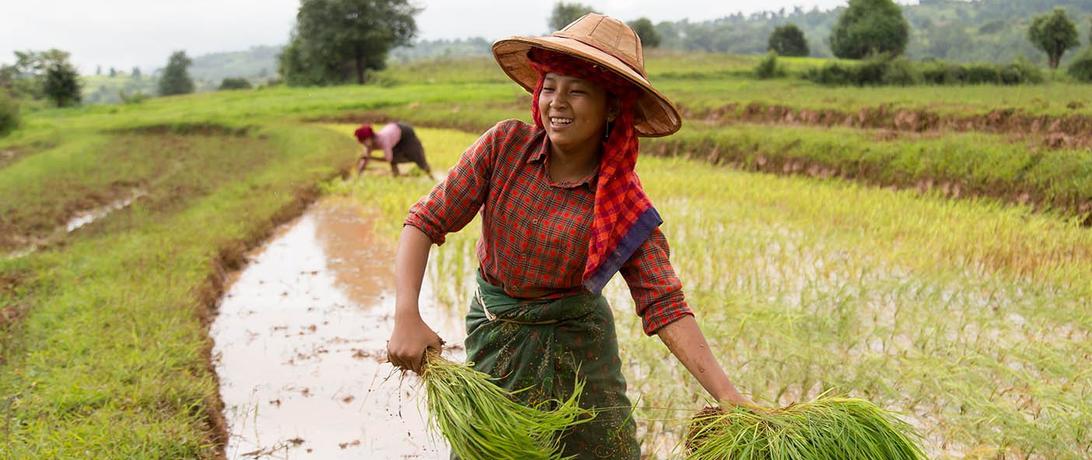
In a world increasingly faced with disaster, Our Secure Future proposes ways that women and the Women, Peace and Security agenda can help mitigate the impact of humanitarian crises.
2017 felt like a year of disaster. From the hurricanes in Texas and Puerto Rico, to a 7.1 magnitude earthquake in Mexico City and massive landslides in Colombia, Sierra Leone, and South Asia, natural disaster impacted every region of the globe. In 2018, natural disaster brought on by climate change is only predicted to worsen and—if that wasn’t bad enough news already—scientists predict that a natural slowing in the Earth’s rotation will contribute to an increase in the number of earthquakes the planet is expected to experience as well. Now, more than ever there is a need for leadership in disaster preparation and response . Addressing increasing risk of humanitarian crises is a task for the Women, Peace and Security agenda. UNSCR 1325 “calls upon all parties to armed conflict to respect the civilian and humanitarian character of refugee camps and settlements, and to take into account the particular needs of women and girls.” Similarly, the 2017 US Women, Peace, and Security Act declares, “the United States should be a global leader in promoting the meaningful participation of women in conflict prevention, management, and resolution, and post-conflict relief and recovery efforts.”
How are men and women impacted differently by increasing environmental degradation and humanitarian crises?
Environmental degradation is harmful to development, and has the greatest impact on women. They are more negatively affected than men by water shortage, deforestation and drought due to their roles as farmers, water collectors, and firewood gatherers. Furthermore, women in developing countries lack the same property rights and decision-making abilities as men. This makes them even more vulnerable to loss of land and resources.
A study conducted by the United Nations Development Programme found that women are 14 times more likely to die during the course of a disaster than men. In events such as earthquakes and floods, women are more at risk because of domestic duties requiring them to remain inside the home. In flooding specifically, female mortality is higher because fewer women know how to swim. In the time following a disaster women and girls face malnutrition. Sometimes rations are distributed first to husbands and sons before daughters and wives. The impact of mortality and famine come alongside an increase in sexual assault that females experience during displacement.
How can the Women, Peace and Security movement impact climate change and natural disaster?
While women suffer disproportionate impacts of climate change, they lead the charge in their communities to protect the environment. Climate Justice and Women’s Rights: A Guide to Supporting Grassroots Women’s Action is full of examples of women who are leading these initiatives. From fighting against carbon emissions coming from an oil refinery in South Africa to insisting local farmers be consulted on dam projects in Vietnam, women can—and do—make the difference.
In November of 2017, member states at the 23rd annual United Nations Climate Change Conference convened in Bonn, Germany to adopt a “Gender Action Plan” that guarantees the equal representation of women and men at the UN Framework Convention on Climate Change. The plan sets out the following five priority areas:
- Capacity-building, knowledge sharing and communication
- Gender balance, participation and women’s leadership
- Coherence of gender considerations across UNFCCC bodies
- Gender-responsive implementation and means of implementation
- Monitoring and reporting
With recent international commitment to greater representation of women in climate change initiatives in 2017, it is up to the Women, Peace and Security movement to see those promises kept in 2018.
Climate change and mass migration due to natural disaster are two of the factors that promise to threaten both global security and the conditions of women in the years to come. The Women, Peace and Security agenda can help address this issue by continuing to encourage initiatives, such as Gender Action Plans on climate change, and bringing women to the table on critical environmental issues.
Tell us your stories of the women fighting against climate change on Twitter with @OurSecureFuture and #WomenSavetheWorld.
Article Details
Published
Topic
Program
Content Type
Opinion & Insights